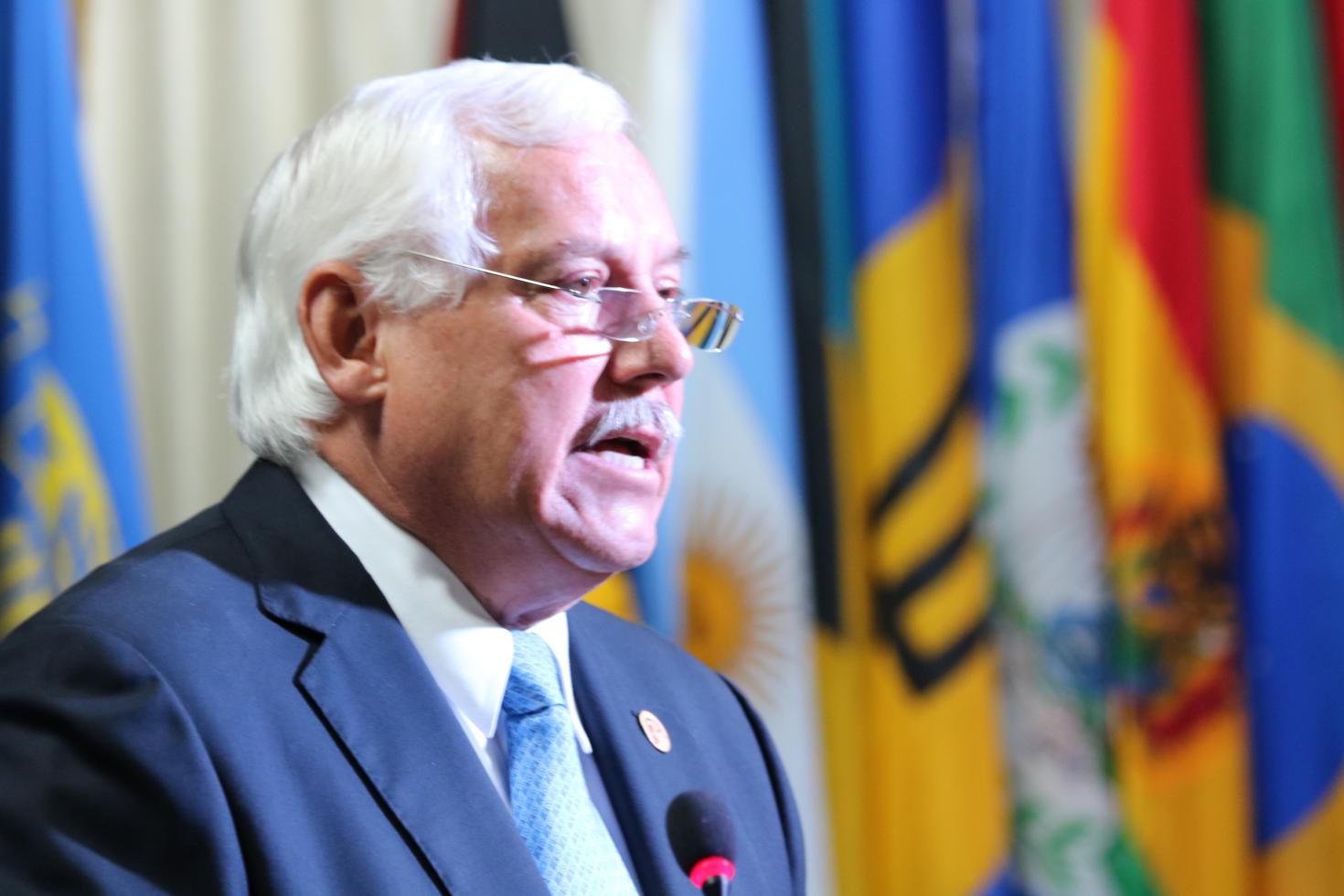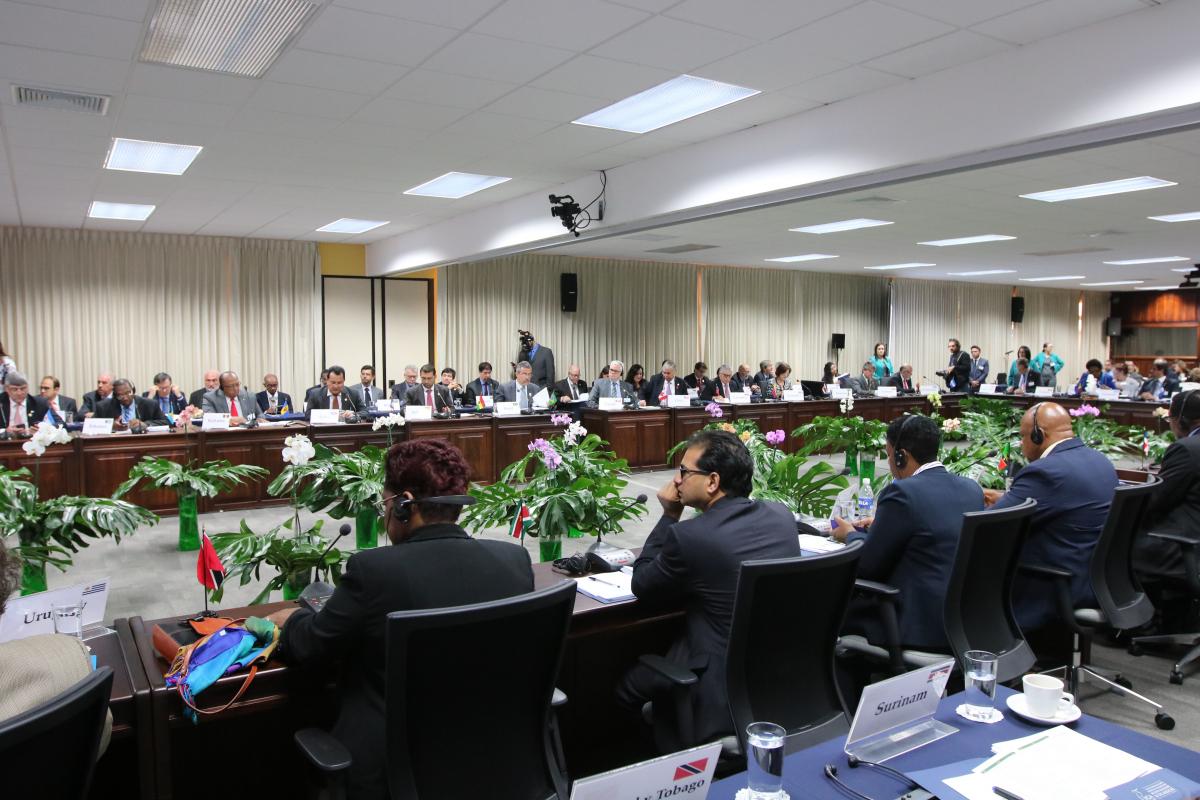Ministers of Agriculture of the Americas applaud the achievements of Victor Villalobos at the helm of IICA

San Jose, November 1st 2017 (IICA). The ministers of agriculture of the countries of the Americas endorsed the achievements of the Director General of the Inter-American Institute for Cooperation on Agriculture (IICA), Victor M. Villalobos, on behalf of the region's agricultural sector. They had just received the final report from his eight years at the helm of this international organization, emphasizing that over 200 initiatives had been undertaken each year.
Villalobos presented his report to the Nineteenth Regular Meeting of the Inter-American Board of Agriculture (IABA), the highest governing body of IICA, at its meeting in San Jose, Costa Rica. The Director General presented every minister with a summary of specific actions taken in his or her own country and outlined the work conducted at the hemispheric level.
After listening to the report of achievements, Bryce Quick, operations director of the Foreign Agricultural Service of the United States Department of Agriculture, asserted that the Mexican Director General’s performance had been “extraordinary,” as during his administration, Villalobos had correctly identified areas of opportunity and had proposed solutions for them.
Ricardo Buryaile, minister of agroindustry of Argentina, underscored the leadership that the Director General had displayed over his two terms, leading 34 countries all faced with different situations and challenges.
Maurício Lopes, the minister from Brazil, agreed, adding that the Institute had proved to be a “first-rate partner” in supporting his country as it developed a modern agricultural model equipped for new challenges on the horizon.
The minister from Jamaica, Karl Samuda, pointed out the ways IICA had helped his country in difficult situations involving the coconut industry, coffee rust and sweet potato. He added that the training opportunities had been especially valuable, with a focus on business practices, manufacturing, greenhouse management and climate change.
The Director General reviewed the major achievements of his two terms of office and urged the ministers to strengthen the Institute’s technical and financial capacity.
“The challenge in my first term was to build up capacities in such areas as technological innovation, agricultural health and food safety, agribusiness and marketing, territorial management for rural development, natural resources management in the face of climate change, and food security. Once we had identified these top-priority issues, we moved toward the current model of technical cooperation, focused on high-impact outcomes,” he stated.

Commitment by the numbers
IICA has led over 200 initiatives per year over these eight years. Some of the work at the hemispheric level has addressed the new requirements of the United States Food Safety Modernization Act (FSMA), active participation in world bodies such as Codex Alimentarius and promoting regulatory frameworks for biotechnology and biosafety.
Business opportunities and productivity have improved in a variety of agricultural chains, including basic grains, fruit, coffee and cocoa in Mesoamerica, honey and roots and tubers in the Caribbean, quinoa and forest products in the Andean region and beef, grains and horticulture in the south.
“Along these same lines, our commitment was to take affirmative actions toward agriculture led by women and young people. We have a variety of methodologies for assessment, empowerment and socioeconomic inclusion that today have become public goods available for the benefit of these important populations and their future,” emphasized Villalobos.
The approach to climate change in agriculture included improving agricultural planning skills in public institutions to reflect the urgent needs for adaptation, mitigation and risk management.
One particularly noteworthy achievement was made in partnership with the government of Mexico, where a scholarship program enabled over 1000 professionals to complete their graduate degrees in Mexican universities. Another training program was hosted on the IICA Virtual Campus, which received nearly 12,000 students for the more than 30 courses launched in 2017.
The ministers of agriculture from the countries of the Americas, over the course of three biennial meetings, asked the Director General to work on specific issues: innovation (2011), water (2013) and productivity (2015). All these requests were met.
- Various approaches taken in innovation included promoting new techniques for beekeeping, traditional crops and greenhouse production, while several research projects with partners produced new varieties of roots and tubers, beans, tomatoes, corn and avocado.
- The Institute also developed innovative models for technology consortia, organic certification, use of bioinputs, handling veterinary medications and platforms for exchange of scientific knowledge.
- Finally, the work on water for farming led to planning, training and construction of irrigation and drainage systems, or harvesting rainwater and operating water reservoirs to help make agricultural systems more resilient.
“The countries stand to benefit when IICA is regarded as a reliable partner,” he concluded.
Más información: evangelina.beltran@iica.int